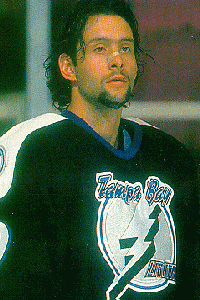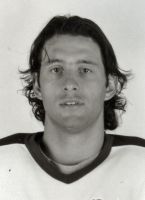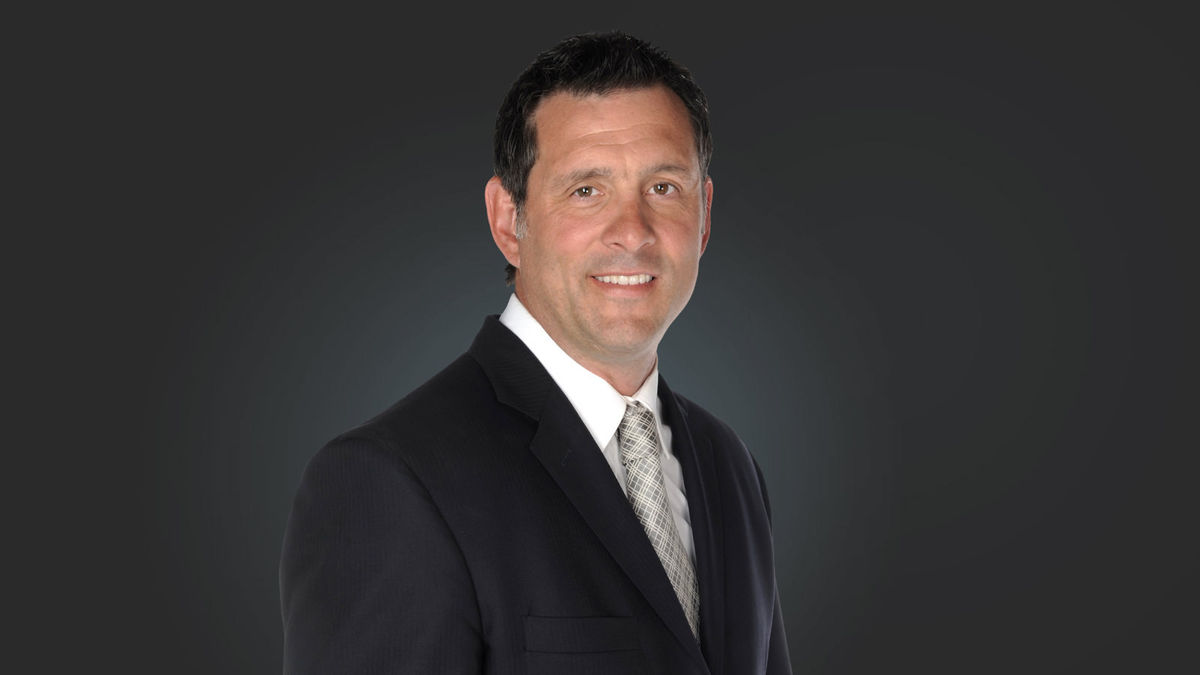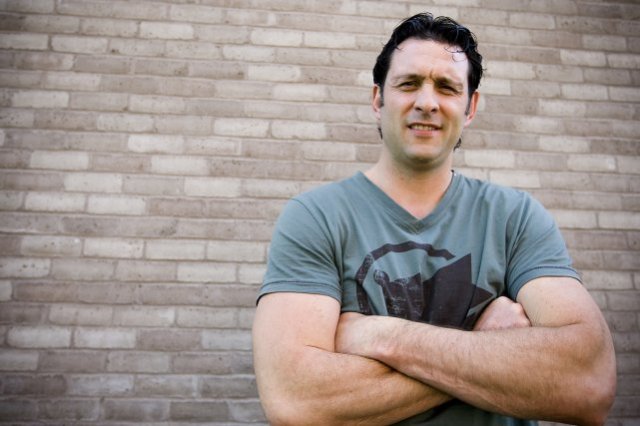Many players have worn a Tampa Bay Lightning jersey since the team’s inaugural season in 1992-93, but none of them have left quite the same mark on the franchise as Enrico Ciccone.
 The Montreal native was part of the organization during two separate stints in the 1990s and while he became a fan favorite for his role as an enforcer on the ice, it was his dedication to his teammates, the organization and the community that made him stand out most of all. So much so that the defenseman was sought out by Lightning founder and then-general manager, Phil Esposito, long before he played his first game in a Lightning uniform.
The Montreal native was part of the organization during two separate stints in the 1990s and while he became a fan favorite for his role as an enforcer on the ice, it was his dedication to his teammates, the organization and the community that made him stand out most of all. So much so that the defenseman was sought out by Lightning founder and then-general manager, Phil Esposito, long before he played his first game in a Lightning uniform.
“I remember it was the first year of the Lightning and we were playing at the Fairgrounds … I was playing with the Minnesota North Stars,” Ciccone said. “I was at the rink and after a game I came across Phil Esposito and he looked at me and pointed his finger at my nose and he goes, ‘You will be a (member of the) Lightning. One day I will come and get you and you will be a (member of the) Lightning.’
“I said, ‘Okay, thank you Mr. Esposito’ and that was it. I never thought that he would say something like that and it would happen a couple years later.”
It was more than just a chance encounter with a Hall of Famer, however, as Esposito meant what he said. He traded for Ciccone during the 1993-94 season in a move that changed the course of the franchise and Ciccone’s NHL career.
Dedication to the Organization and the Tampa Bay Community
When Ciccone arrived in Tampa, the Lightning were lead by head coach Terry Crisp, who together with Esposito understood his game and gave Ciccone an opportunity he’d never had before — to play his style at the NHL level with the blessing of his coach and GM.
Up to that point, he’d taken on the role of an enforcer, challenging opposing team’s toughest players in fights to protect his teammates and playing a physical style that helped to set the tone of a game. Inherent with that role was a constant balancing act between controlling his emotions and doing what was best for his team. At times for Ciccone, the emotional side of the game admittedly took over for him, resulting in penalties — just as it does for many of the NHL’s most successful enforcers — but Crisp and Esposito understood this and embraced it.
“For the first time in my life, I got a different message,” said Ciccone. who was 24-years-old at the time he arrived in Tampa. “Crispy took me in and said, ‘Cicco, play your game and do what you have to do. We want to live with your bad penalties. I know sometimes we’ll lose games because of your bad penalties, but in the end, if we put that on the scale, we know that you will do better for us than the negative side of it.’”
Ciccone took those words to heart and became a player who was willing to do whatever was asked of him by the organization on and off of the ice.
“I could not believe it. It was the first time a coach spoke to me like that and that forced me to give it all I had,” Ciccone said. “I was ready to die on that ice. I was ready to do everything for that team. I would be available 24/7 for those guys just because of the way they opened their arms — they understood me.”
This included appearing on behalf of the Lightning at community centers, YMCAs, local schools and other events — helping to establish a positive presence for the franchise in the Tampa Bay area during the organization’s earliest days.
Becoming a Fan Favorite
During his first stint with the Lightning, Ciccone played 107 games in parts of three seasons, compiling 12 points and 535 penalty minutes.
“I never understood (then) why I was on those big (Lightning) billboards along the street,” Ciccone said. “I never understood why my face was on the schedule when they gave it to everybody. (Brian) Bradley just scored 40 goals! (Roman) Hamrlik was a rising star…why am I on that thing?!”
Ciccone grew up in the 1970s in hockey-crazed Montreal — a decade in which the hometown Canadiens won six Stanley Cups as one of the most successful dynasties in NHL history. At the time Ciccone became a member of the Lighting, the team had played just over 100 games in their history and many fans in the area were being introduced to the game of hockey for the first time.
“People at first, wanted to come and see a show — they came to have fun and have a good time,” Ciccone said, reflecting on how he quickly became one of the faces of the franchise at that time. “What I understood is that people came in and they wanted to have a good time and I was a part of the good time … about the fighting, about the hitting, about all of that type of stuff.”
There is perhaps no better example of the sort of presence Ciccone had with the franchise than when he looks back on a conversation he had with Esposito once before a game.
“One time, I had a bad shoulder and I wasn’t playing and Espo came to me and said, ‘Cicco, shut up, don’t tell anybody you’re hurt because if you say that you’re hurt and won’t play tonight, people won’t show up!’”
Despite Ciccone’s willingness to do anything on and off the ice for the organization, Esposito was forced to trade him to the Chicago Blackhawks during the 1995-96 season when he was able to add a promising forward, a defenseman and a draft pick for the fan favorite. It was a hockey trade that wasn’t easy for Esposito or Ciccone, who says his heart was broken at the time, despite understanding why it happened.
Ciccone went on to play brief stints with the Blackhawks, Carolina Hurricanes and Vancouver Canucks before returning to the Lightning during the 1997-98 season. Things looked a bit different than they did when the was traded a few years earlier. The Lightning were playing in a state-of-the-art arena, then known as the Ice Palace — located in the heart of downtown Tampa. Crisp had been replaced behind the bench by Jacques Demers and a franchise that had been on the upward trajectory towards success when Ciccone departed was now one going through the start of a re-build with numerous changes on and off the ice.
Paying It Forward
The team struggled to a 17-win finish that season, earning them the chance to select Vincent Lecavalier first overall in the 1998 NHL Entry Draft. He was projected to be a future franchise player and for an organization teetering on the brink of rumored financial collapse, the type of star who could help turn the franchise around. When Lecavalier was drafted, then-team owner, Art Williams, anointed him the “next Michael Jordan of hockey,” despite being just 18-years-old and never skating a shift in the NHL.
When Ciccone heard Williams’ comment, he felt for Lecavalier and wanted to do whatever he could do to help him break into the game’s highest level as a teenager — a feat much rarer at the time than it is in today’s NHL.
Ciccone participated in a summer league made up of NHL players who played their games just outside of Montreal in an effort to help prepare themselves for their respective teams’ training camps. Shortly after the draft, Lecavalier came out to one of their practices and Ciccone was impressed with his play and the way he carried himself. After the practice, Ciccone met Lecavalier and his father, Yvon, for the first time and made them an offer they couldn’t refuse.
“I introduced myself and I said, ‘I will be heading out to Tampa in a couple of weeks, in mid-August, and I would be happy to have Vinny come in early so he can meet up with the guys and skate with the boys there … so he doesn’t get surprised when he comes into camp and he can be settled in and feeling like he’s right at home. I don’t know if he’ll make the team, but if he makes the team, he can stay at my home as much as he wants. I will keep him, I’ll be the big brother if you want.’”
Lecavalier and his father accepted on the spot and were grateful that Vinny had the opportunity to be taken under the wing of an NHL veteran to start his career.
“They said, ‘Thank you very much, that really, really helps us a lot,’” Ciccone said. “So sure enough, he came in and stayed with us for about three months. Me and my wife took care of him like he was our little brother … hopefully we made sure that we made it easy for him to transition from leaving home … leaving his nest and coming to another nest.”
Ciccone enjoyed the opportunity to take on that sort of role for Lecavalier and to this day, is still impressed with his competitiveness and his desire to win — character traits of Lecavalier’s that shine through in one of Ciccone’s favorite stories of living with the future NHL star as a teenager.
“One time we were in the pool in the backyard and we started playing a little game — whoever could hold their breath the longer under water, so we started doing it,” Ciccone said.
“That guy could stay under water about two minutes, I mean, that guy would not get up! I almost died coming up (for air),” Ciccone said, laughing as he reflected on it. “That guy wanted to beat me … he stayed under water forever and at one point I just grabbed him by the neck (to pull him out of the water) — I thought he was drowning! He came back up and he said, ‘Do I have enough?’ I said, ‘Heck yeah you have enough, you got a minute over me!’
“I said, ‘Maybe we should change games … because I don’t want to have the first NHL pick drowning in my pool over a stupid game that we played!’”
Ciccone played just 28 games in parts of two seasons with the Lightning, as his playing style throughout his career had taken its toll and injuries started to mount. He finished the 1998-99 season with the Washington Capitals and played the following season in Germany before skating in three games with the Canadiens and retiring during the 2000-01 season.
Remembering the Past
Shortly after Jeff Vinik purchased the team in 2010, he placed an emphasis on honoring the history of the Lightning, which included the addition of the Lightning Heroes Collection at Amalie Arena — large pictures of 31 of the most significant and meaningful players in the history of the organization, with an accompanying biography. The pictures adorn the walls of the terrace level at the arena and Ciccone is one of the players honored. While it may seem like something simple to those that see it, for players like Ciccone, it means the world.
“I couldn’t believe it,” Ciccone said, as he described his reaction to learning that the organization had chosen him as one of those players. “Just knowing that they remember … I had tears in my eyes and I choked up … that was one of the most touching moments in my life.”
Although Ciccone lives in Montreal, the Lightning and the Tampa Bay community have a special place in his heart and he and his family plan to purchase a home to live in during the winter.
“(Tampa) is my second home,” Ciccone said. “I love Tampa, I love the logo and I’m a (member of the) Lightning for life.”
His Legacy
At 46-years-old, he’s accomplished many things on and off the ice — whether it was standing up for teammates or helping people in the community — but he’s especially appreciative of how he is remembered as a person. It’s something that transcends the confines of the 200 by 85 foot sheets of ice he skated on during his hockey career and applies to all facets of life.
“I think the best thing that was said about me wasn’t about my eloquence on the ice or my skating ability or my stickhandling or my left punch or my right hook. It was: ‘The guy shows up every night,’” Ciccone said. “In life, you can be good, you can be the best, you can be average, but if you don’t show up every night … if you don’t show up to work with the best intentions, you will fail.
“When I read that, I always kept it with me. When I didn’t feel like it, I said, ‘you have to show up.’ Always show up for the games, don’t let anybody down and that’s how I would like to be remembered … as a guy that showed up to play every game and never let his teammates or his colleagues down.”
It’s been nearly 25 years since Esposito approached Ciccone and told him he’d be a member of the Lightning one day. Fortunately for the franchise and the Tampa Bay community, Esposito kept his word. In doing so, he brought the organization one of their earliest stars and a person who won’t soon be forgotten.
Follow me on Twitter @StevenDiOssi and please “like” LightningShout on Facebook. You can email us at [email protected].
Add The Sports Daily to your Google News Feed!


